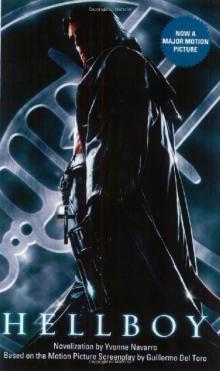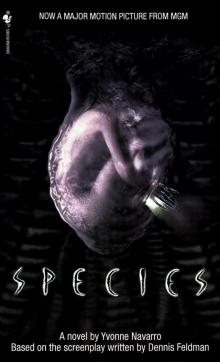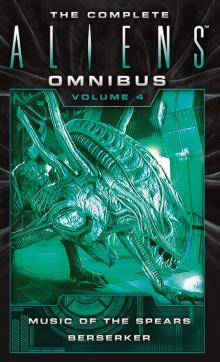- Home
- Yvonne Navarro
Species II
Species II Read online
S P E C I E S
I I
They called her Sil. A genetic hybrid, born in a laboratory and bred from a unique mixture of human and alien DNA, she posed a deadly threat to humanity’s domination of the Earth—until she was tracked down and destroyed.
Now an exact replica of Sil, called Eve, has been created as part of a top-secret government research project. The scientists’ goal is to study this new creature in hopes of finding a way to defend mankind against another extraterrestrial menace.
But they may already be too late. Astronauts returning from Mars have brought with them an alien infection that has invaded their minds and bodies, turning them into unwitting hosts to another malevolent breed of invader. A new species is on the loose, leaving death and destruction in its wake.
Eve is humanity’s only hope for survival—or perhaps its ultimate destroyer.
When Laura and Press first arrived at the Garberville Psychiatric Institute, they’d been shown to a lovely reception area just off the main foyer—appearances were everything here. However, their “Special Government Agent” identification cards had gained them access to this room—small with drab gray furnishings and dirty walls—guarded by a cold orderly.
“I’m going to bring Mr. Cromwell in now,” the orderly said curtly. She returned with Cromwell to the room. “You’ve got ten minutes.”
Press extended his hand. “My name is Preston Lennox, and this is Dr. Laura Baker.”
Abruptly, Cromwell’s fingers came together, hard, like a man who’d suddenly decided it was time to launch a desperate prayer. “I know why you’re here . . . I’m a molecular biologist,” Cromwell hesitated.
Laura shot a glance at Press. Cromwell continued, “At the present time, Mars is a little over four and a half billion years old. It had water, an atmosphere, and a hospitable climate. I believe the aliens that landed on that planet made it the hunk of useless rock we see today. They spread like a plague across its surface, the life-form depleted its supply of water and raw materials.”
When no one said anything, Cromwell again folded his hands and continued. “When I heard the United States was sending a landing mission to Mars, I strongly urged the government to reconsider.”
“Why?” asked Laura.
Cromwell’s cheeks flushed. At its best, it would have always been a harsh planet on which only an extremely strong, hardy life-form could exist. A life-form that would no doubt be incredibly dangerous and harmful to humans! A species that could very possibly go dormant and leave its own DNA on the surface—like spores—so that any attempt by another form of life would result in biological contamination!”
Both Laura and Press jumped as Cromwell’s hand shot out and snatched a fly from midair, “We will be to these aliens what this fly is to us.” He opened his palm and held it out, showing them the insect’s crushed carcass.
SPECIES II
Copyright ® 1998 by Metro-Goldwyn-Mayer
All rights reserved, including the right to reproduce this book, or portions thereof, in any form.
A Tor Book
Published by Tom Doherty Associates, Inc.
175 Fifth Avenue
New York, NY 10010
Tor Books on the World Wide Web:
http://www.tor.com
Tor® is a registered trademark of Tom Doherty Associates, Inc.
ISBN: 0-812-57075-8
First edition: July 1998
Printed in the United States of America
This one is for Dennis Feldman,
with gratitude for dreaming up such
a wonderfully wicked creature
in the first place.
ACKNOWLEDGMENTS
Thank-you to Dennis Fekjman and Howard Morhaim, who worked so hard and fast to make this project come alive. As usual, thanks to Don VanderSluis for tech/engineering and weapons help, and to Dr. Johnny Ellison for his medical expertise. And I certainly won’t forget all the people who patiently answered my pesky questions: Robyn Fielder; Matthew Woodring Stover, Sean Jordan of ZEntertainment (who prowled the Internet for me in search of photographs), and yet again, Don VanderSluis. Special appreciation goes to my Dad and Elaine, who kept me fed and brought me turkey leftovers on Thanksgiving so I could keep working. (What—me cook??!)
Thanks, too, to everyone who wrote or e-mailed to say how much they liked the first book, and to all of you who shelled out hard-earned money to buy and read the second.
And as always, Darke Palace is open:
http://www.yvonnenavarro.com/
Come visit.
PROLOGUE
“Even now, Mars, the god of war, is still sending men to their graves . . .”
Approaching Mars—Two Hours from Orbit
“Have you ever seen anything so beautiful?”
Captain Patrick Ross reluctantly pulled his gaze away from the viewport and turned toward the speaker. It was hard not to smile at the sight of Dr. Anne Sampas as she leaned forward over her control console, her green eyes filled with childlike wonder below the heavy waves of her deep auburn hair. “No,” he said honestly. “I don’t think I have.”
When she didn’t say anything else, he spun his chair until he again faced the heavy glass, felt himself once again get lost in the scene in front of him:
Mars.
The planet looked like a huge red marble suspended against a backdrop of sparkling black velvet. Slashed by canyons and painted with shadows that ran from orange to dark red to utterly black, in his mind Ross knew the Martian surface was cold and lifeless, but right now it looked anything but. It looked . . . hot, and very much alive, as though any moment might bring an eruption from one of the dormant volcanoes that spotted its surface: Ascreus Mons or Pavonis Mons perhaps, silent, murky spots on the Martian surface to the west through the viewing portal.
“Control, this is Excursion. We have OMS cut off, over.” The deep voice made Ross jump then look to his left, where the flight navigator, Dennis Gamble, was already deftly flipping switches on his control panel.
There was a static-filled blast of noise from the capsule’s communicator, then the whine of an unidentifiable voice. “Excursion, this is Control. Please advise when ET umbilical doors are open, over.”
“Roger that.” Dennis’s dark gaze caught and held Patrick. “Time to start suiting up.” There was a pause, then Gamble added, “You’ve got two hours, Patrick.”
Ross nodded and squelched the urge to swallow, afraid Dennis or Anne would see the movement and know he was nervous. Not afraid, just a little . . . jittery. No big deal, he’d done this half a dozen times. Walking in space or on the moon was commonplace; walking on Mars . . . now this was something. The first time, and he was going to get to do it. God, sometimes he felt like the luckiest man alive.
Ross made his way carefully toward the back of the ship, his thoughts divided between his mental checklist for the upcoming mission and wondering what his dad was doing back home on Earth. Watching the mission at NASA, of course, but what was he doing? Standing proud and tall in the Mission Control Room next to Melissa, Patrick’s girlfriend, with his six-foot-five frame towering over everyone else? Or sitting on someone’s chair so it wouldn’t be obvious that he might have had a belt or two of Old Grand-Dad?
Shaking away the thought, Ross slipped out of his in-flight suit, then meticulously began setting out the components of his Extravehicular Activity space suit—his life depended on nothing being overlooked, but he was too familiar with the routine to be concerned about forgetting something. Besides the oft-repeated space walks he’d performed, the practice sessions at NASA were too numerous to count. He could, simply put, don the EVA in his sleep. Plus, Anne Sampas, the flight’s M.I.T. mission scientist, would do everything but look at his suit-up job under a microsco
pe before she’d let him strap down in the landing module. A final vision check and then, pulse heightening, Ross took a deep breath and stepped into the absorbent underwear to begin the final steps of suiting up.
“Mission Control,” Dennis Gamble said clearly into the microphone. “We have module at gimme five seven gimme.” After a few seconds, a confirmation message came back and Dennis flipped more switches on the console, his fingers a blur of efficiency. “Disengaged,” he barked into the transmitter. A few breathless seconds, then he grinned at Anne. “Hope he’s holding onto his hair. He’s gonna feel a little bump—”
To punctuate his words, there was a faraway clanking sound and a slight vibration ran through the floor.
“—and grind.”
Eyes wide, they both leaned forward to peer out at the void of space through the viewport.
The landing module shuddered and gave a short, metallic groan as the hold-downs to the Excursion were released, then it tilted slightly. A fleeting sensation of giddiness sank into Ross’s stomach as the craft spun gently, bringing the main vessel into view. For a moment, all he could do was gawk at the Excursion’s size, let himself feel like a fly buzzing around the hide of a huge horse. Then the realization that now it was just him suddenly hit home. I’ve been orphaned, Ross thought, and somehow the idea that this was Mars—Mars, for God’s sake—just made it all the worse. The moon versus Mars . . . the difference was like being separated from home by the width of a town or the stretch of a continent.
He felt weightless and lost, temporarily out of control, as Dennis steered the landing module back around, giving him a full shot of the parent spacecraft in all her glory. It was hard not to feel small and abandoned as he watched the gleaming alloy ship slide past; it seemed to go on and on, moving silently from burnished silver to a grand, panoramic view of the patriotic red, white, and blue painted on the hull. Ending, of course, with the requisite colorful logos of the corporate sponsors that had so generously pumped money into the National Space Exploratory Group and made the mission possible.
Abruptly the loneliness was gone, and Ross wondered if his two partners were smirking as their video playback gave them the same scene. Or was he the only one who found it amusing to see the traditional red-and-white logo of Classic Coca-Cola, the famous Golden Arches of McDonald’s, and the simple black-and-white Nike swoosh emblazoned across the side of the massive spaceship?
The module lurched and picked up speed, the cockpit rattling around him with enough noise bleed-through to make him feel like a piece of popcorn in a microwave. He ground his teeth and found the radio switch. “Dennis, ease up on those thrusters, would you? Bring turbo alignment to negative seven, over.”
“Roger that.” Dennis’s voice sounded grainy and already far away. “ETA twenty-eight minutes, seventeen seconds.” A beat of silence, then Dennis spoke again. “Make that fifteen . . . no, wait. Fourteen.”
Patrick grinned and ignored him, feeling the module’s movement smooth out under the navigator’s capable hand. Never a doubt, obviously—he knew no one else in the world who could do a better job of this than Dennis Gamble. The black man was the best and could steer a missile ship into a landing bay with the door half-closed, his good eye taped shut and only one finger free. And Ross’s opinion had nothing to do with the fact that Dennis Gamble was his best friend.
He’d thought the next half hour would pass slowly, each torturous minute trudging along while he fidgeted beneath the straps—he hated these tiny cockpits with a vengeance—and Dennis did all the work back on the mother ship. Anne, too, was likely buried in last-minute calculations and notes, that overly intelligent mind of hers no doubt cranking out another two dozen experiments to conduct on the soil samples he would bring back. Patrick had pictured himself sitting bored and impatient in the module while he performed his routine checks, just another matter-of-fact landing well on its way to completion.
Yeah, right.
The half hour was gone—zip—seemingly before Patrick could blink, the slice of time utterly erased by the sight of the sprawling Martian landscape that filled the screen of his console. His training still carried him through the flight routines but had he not been tied into his chair, he would’ve jumped in surprise at the voice crackling over the communications line from Mission Control. “Copy that,” he said instantly, his gaze tracking the numbers on the instrument panels. “Descent target zero one niner. Synchronous orbit phase-cycle is a go. We are on the mark.”
“Turbo alignment is two seven Cavalier. Descend, defend, watch your rear end.”
Patrick chuckled but before he could respond, Anne’s voice came over the transmitter. “And don’t forget to watch out for little green men.”
This time he laughed. “If there were any little men here, I’m fairly certain they’d be the color of rust. Don’t worry, Annie. I’ll be fine.”
“Of course you will,” Dennis shot back. “You’re Patrick Ross, all-American hero, remember?”
“Aren’t I supposed to have a cape?”
“Forget it. It gets tangled with the EVA suit.”
Patrick laughed again, then grew serious and frowned at his instruments. “Hey, shouldn’t I be—?”
“You are,” Dennis said smoothly as the module lurched to one side, then the other . . .
. . . and settled itself on the bleak red rubble of Martian soil.
Inside the Excursion, Dennis Gamble and Dr. Anne Sampas slammed their palms together in a high-five that neither would admit was painful. “Yee-ha!” Anne whooped. “We made it, Dennis!”
Her partner gave her a wide grin, then turned back to the console. “Mission Control,” he announced loudly. “We have surface interface. I repeat, we have surface interface. IMU alignment is complete. We show two eight degrees, three six minutes. Over.” He paused, then spoke again. “Patrick, do you copy?”
“Loud and clear.”
Damn, Dennis thought as his smile widened, along with Anne’s. If I get any happier, my face is going to split in two. “Congratulations, brother,” he said into the microphone. “You just became the first man on Mars. Set your digital readout. You’ve got one hour till party time. Make yourself useful until then and bring back some souvenirs for our scientist friend here.”
“I can handle that.”
Anne pushed her hair behind her ears and leaned over the console. “Is everything functional down there?” Her voice had gone from jovial to strictly professional. “No problems to report?”
“Not a one,” Patrick came back immediately. “You see me on the video screen?”
“Got it,” Dennis said. “Clear as Monday-Night Football.”
They heard Patrick snicker, then saw him reach for an LED display and start the counter. Every now and then, a white line of solar interference would cut across the display, but that was to be expected, and they still saw the bright numbers start counting up from 0:00 as the astronaut in the module adjusted an array of telemetry switches. “Annie,” Patrick said, “I think things are just about ready for you on my end. If your connection is clear, we can go on and fire up your toys.”
Anne Sampas nodded, her eyes glittering emerald green with excitement in the glow of the instrument panels. “I’m going to switch on an external camera,” she said. “Right . . . now.” She gave a flick of her forefinger and there it was in full color—red and orange and rusted brown—so completely spectacular that it nearly took her breath away.
“Man,” Dennis said from his seat. “Is that unbelievable or what?”
“God, yes. And Patrick—he’s down there, right on the surface. He’s going to walk on it in just an hour.” She shook her head, but her gaze never left the display. “Can you imagine how completely, utterly tiny he must feel?”
“I heard that, Annie. You forgot to toggle off the transmitter.”
She blinked and looked at Dennis guiltily, but he only gave her an it’s-too-late-now shrug. “Sorry, Patrick, It was just a foolish thought—”
But the first video display showed their comrade down on the surface as he waved a hand in dismissal. “Aw, I’m just kidding. And anyway, you’re right. It’s a pretty damned lonely feeling—but I know I’ve got you guys looking out for me.” On the vaguely grainy display, Dennis and Anne could see one corner of his mouth lift.
“You bet,” Dennis cut in. “Annie, let’s get those Land Rovers going. We need to bring ’em out and at least start collecting our samples before Patrick hits the ground. Can’t have him doing all the work.”
She nodded and settled herself at the console. “I’m set. Patrick, are you ready to synchronize?”
“Ready when you are.”
“Great. One, two, three, mark.” On the dual cue, a small hatch in one side of Patrick’s landing module flipped down with a precise movement of hydraulics. “I’ve got the camera carrier,” Anne said, her voice shaking with exhilaration. “You’re in charge of the drill.”
“I knew it,” Dennis quipped. “The man comes all this way and gets stuck digging in the dirt.”
“Always did like making mud pies.” Patrick’s voice was enthusiastic, his face set with concentration despite his easy words, his fingers light on the remote controls in the landing module as he worked his Rover around the rock obstacles on the surface.
“I’m afraid for those you’ll need water,” the doctor said absently. She was piloting her camera-armed Rover close to where Patrick’s mechanism had stopped on the near side of a dark-colored, three-foot-long rock and was slowly working a drill into the barren soil. “Not enough of that on Mars.”
“There’s considerable evidence of subsurface ice,” Dennis commented.
“True,” Anne agreed. “But liquid water can’t exist on the planet’s surface at the present time. I’m afraid Patrick’s mud pies would have had to be made in the first third of the planet’s life—the last of the Noachian Period, or perhaps the first part of the Hesperian Period.”

 Hellboy
Hellboy Concrete Savior
Concrete Savior Species
Species AfterAge
AfterAge Ultraviolet
Ultraviolet Highborn
Highborn Species II
Species II Aliens Omnibus 4
Aliens Omnibus 4 Paleo
Paleo Elektra
Elektra